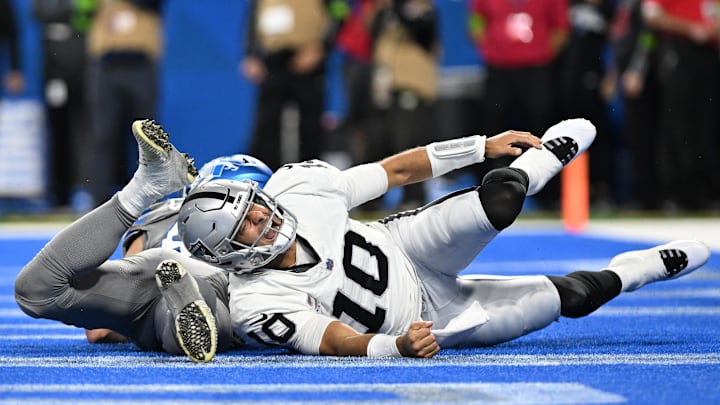These days, it's undeniably hard to be a defensive player in the NFL. Hit the quarterback in practically any fashion, and there's a coin flip chance you'll draw a flag and a fine may come too.
Last Monday night, Lions rookie linebacker Jack Campbell fell down on a blitz and ended up hitting quarterback Jimmy Garoppolo low and to be fair Garoppolo was fortunate not to have suffered a bad injury to his left knee. A flag naturally came for roughing the passer.
Jack Campbell was called for roughing the passer on Jimmy Garoppolo. pic.twitter.com/Vp7njgzPN3
— Tanner Phifer (@TannerPhiferNFL) October 31, 2023
Campbell tripped over the foot of a Raiders' lineman--inadvertent contact to be sure--and he literally fell into Garoppolo with no room to get to his feet. But the rule book leaves no room for nuance and/or unavoidable circumstances, and officials don't show the ability to make calls or not make calls based on any nuance they might see.
FWIW, Jack Campbell clearly trips over the left guard’s foot before his roughing the passer penalty.
— Jeremy Reisman (@DetroitOnLion) November 4, 2023
Reading the rulebook, it’s hard to tell if that matters.
“It is not a foul if the defender is blocked (or fouled) into the passer and has no opportunity to avoid him.” pic.twitter.com/pYf1FrjEeg
On Saturday, when fines from the previous week's game are announced by the league, Campbell was fined $14,871 for his low hit on Garoppolo.
The NFL fined #Lions LB Jack Campbell $14,871 for roughing the passer — a low hit on #Raiders QB Jimmy Garoppolo last week. pic.twitter.com/AsJ2LuSPcD
— Tom Pelissero (@TomPelissero) November 4, 2023
Two Detroit Lions draw fines for Week 8 infractions
Campbell was not the only Lions' defensive player to draw a fine for a Week 8 infraction. Cornerback Jerry Jacobs was fined $5,229 for unnecessary roughness, when he went low on the Raiders' lead blocker on a toss play. It is a penalty by the letter of the rulebook, which prohibits initiating contact below the waist outside the tight end box unless someone is trying to catch a pass, and it applies to both sides of the ball in a situation like the one Jacobs was in.
But on the other hand, as I tweeted after the play....
So a smaller defender like Jerry Jacobs is just supposed to let himself get pancaked by a bigger guy?
— Brad Berreman (@bradberreman24) October 31, 2023
It appears that yes, a smaller defender like Jacobs is just supposed to let a fullback, tight end or lineman use their size advantage to block him easily and clear the edge on a run play like that. Engaging said blocker chest to chest (for lack of a better term) is a recipe for him to be put on the ground, but going lower is prohibited.
Campbell and Jacobs both committed penalties last Monday night, that's undeniable by the letter of the rules. But the "what are they supposed to do?" question is invited in both situations, as the NFL makes it hard to be a defensive player in the name of giving the offense every possible advantage.
